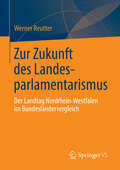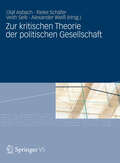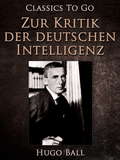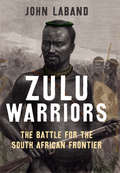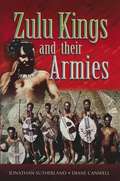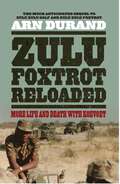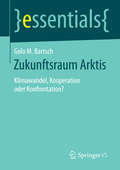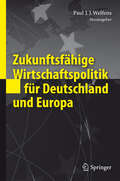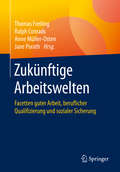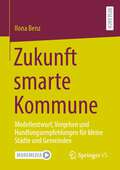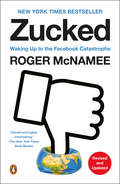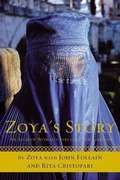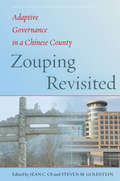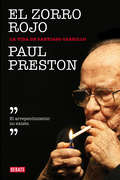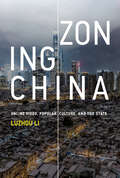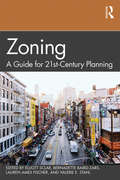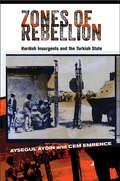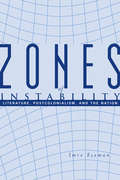- Table View
- List View
Zwischen Sozialisation und Selektion: Die Rolle der Parteijugend bei der Rekrutierung von Berufspolitikern in Deutschland (Empirische Studien zur Parteienforschung)
by Claudia HülskenDie Jugendorganisationen der Parteien in Deutschland gelten als Sprungbretter für politische Karrieren. Für den politischen Nachwuchs können sie ein Ort der Sozialisation und ein Organisationsrahmen für das Schmieden karriererelevanter Netzwerke sein. Darüber hinaus kann die Parteijugend auch als Bewährungskontext und als Hausmacht von jungen Mandatsinteressierten fungieren. In ihrer Publikation untersucht Claudia Hülsken in einer qualitativen vergleichenden Studie die Funktionen der Jungen Union (CDU) und der Jusos (SPD) für die innerparteiliche Auswahl zukünftiger Berufspolitiker. Im ersten Teil der Arbeit wird die kollektive Rolle der beiden Jugendverbände am Beispiel der Kandidatenselektion zur Bundestagswahl 2013 in Nordrhein-Westfalen und Niedersachsen in den Blick genommen. Der zweite Teil untersucht die individuelle Bedeutung des Parteijugendengagements für politische Karrieren auf der Grundlage biografischer Interviews mit Landtags- und Bundestagsabgeordneten.
Zwischen Laïcité und Theokratie: Der Konflikt zwischen Islamist:innen und Säkularen in Tunesien (Politik und Gesellschaft des Nahen Ostens)
by Valerian ThielickeSeit dem Übergang zur Demokratie in Tunesien scheint der Konflikt zwischen der islamistischen Ennahda und den nichtislamistischen Parteien das Parteiensystem zu strukturieren, dennoch besteht Uneinigkeit über den Konfliktgegenstand. Durch eine vertiefte Analyse der vorfindbaren kollektiven belief systems, konnte der Band den Unterschied in den Wertevorstellungen und Ansichten der Islamist:innen und Nichtislamist:innen herausarbeiten und zeigen, dass sie sich tatsächlich unterscheiden. Dabei steht nicht die Ordnung des religiösen Feldes bzw. das Verhältnis der Religion im Staat im Zentrum, sondern ihre Vorstellungen von der nationalen identität und der idealen Einrichtung der Demokratie.
Zwischen gesellschaftlichem Auftrag und Wettbewerb: Sozialmanagement und Sozialwirtschaft in einem sich wandelnden Umfeld (Perspektiven Sozialwirtschaft und Sozialmanagement)
by Christoph Gehrlach Matthias Von Bergen Katharina EilerDer Band thematisiert aktuelle Diskurse um Veränderungen und Herausforderungen in Organisationen der Sozialwirtschaft im Kontext von politischen, wirtschaftlichen, gesellschaftlichen und technologischen Entwicklungen. Es gilt, sich den sich wandelnden Rahmenbedingungen anzupassen und passende Lösungen für neue und alte Problem zu finden.
Zwischen Europäisierung und Renationalisierung der Freizügigkeit: Eine Finanzkrisen-bedingte Migration von Portugal nach Luxemburg
by Claudia Hartmann-Hirsch Fofo Senyo AmétépéLuxemburg hat eine atypische, effiziente Migration. Die rezenten Portugiesen unterschichten sich so wie ihre Vorgänger des Salazar Regimes trotz höherer Bildungsabschlüsse, während sich die Bürger der neuen Mitgliedsstaaten an die Spitze der Pyramide setzen. Das starke Nord‐Süd-Gefälle zwischen Luxemburg und Portugal wird an Hand einiger Indikatoren deutlich. Die Freizügigkeit wird durch Urteile des EuGH auf Initiative nördlicher Mitgliedsstaaten gegen südeuropäische Krisen‐‚Flüchtlinge‘ reduziert und renationalisiert. Aus den Kategorien EU‐Bürger versus Drittstaatsangehörige entwickeln sich ökonomisch starke EU‐ und nicht‐EU Migranten versus schwache EU- und nicht EU-Migranten.
Zur Zukunft des Landesparlamentarismus
by Werner ReutterDie Zukunft des Parlamentarismus und insbesondere der Landesparlamente ist ein Thema, das gegenwärtig politisch und politikwissenschaftlich breit diskutiert wird. Das Buch schließt an diese Debatten an und führt sie - vor allem am Beispiel des Landtages Nordrhein-Westfalens - konstruktiv weiter. Es untersucht die Arbeitsstrukturen, parlamentssoziologische Aspekte sowie die Performanz der Landesparlamente. Auf dieser Grundlage werden die zentralen Herausforderungen analysiert, denen sich die Landesparlamente in Zukunft gegenübersehen werden, und es werden Vorschläge entwickelt, um diesen Herausforderungen konstruktiv zu begegnen.
Zur Relevanz der schulischen Sozialbeziehungen für die politische Unterstützung im Jugendalter
by Johanna Fee ZiemesIn diesem Buch untersucht Johanna F. Ziemes die Relevanz von Sozialbeziehungen für die politische Sozialisation von Schüler*innen. Schüler*innen sind heranwachsende Bürger*innen, die Aspekte der politischen Unterstützung entwickeln und verleihen. Hierzu gehören Einstellungen, Identitäten und Werte. Die politische Unterstützung von den heranwachsenden Bürger*innen ist für Demokratien relevant. Auf Grundlage der Daten der International Civic and Citizenship Education Study 2016 (ICCS 2016) werden verschiedene schulische Bedingungen für die Entwicklung politischer Unterstützung untersucht und diskutiert. Besonders im Vordergrund stehen hier die schulischen Sozialbeziehungen als Aspekt des Schulklimas. Die vorgestellten Studien betonen die Relevanz der Sozialbeziehungen für die politische Sozialisation.
Zur kritischen Theorie der politischen Gesellschaft
by Veith Selk Rieke Schäfer Alexander Weiß Kerstin Kock Olaf AsbachDer Band versammelt Beiträge, die aus Anlass des 65. Geburtstages von Michael Th. Greven verfasst worden sind. Im Zentrum steht dabei insbesondere die Diskussion der theoretischen und zeitdiagnostischen Potentiale der von Greven vorgelegten Theorie der "politischen Gesellschaft". Die Beiträge gruppieren sich dabei um die folgenden Schwerpunkte: Zu einer Theorie der politischen Gesellschaft - Zum Zustand von Politik und Demokratie in der Gegenwartsgesellschaft - Politik und Demokratie im Prozess von Europäisierung und Globalisierung.
Zur Kritik der deutschen Intelligenz (Classics To Go)
by Hugo Ball"Wenn man will, ist der Sinn dieses Buches, daß es die während des vierjährigen Krieges gegen die Regierungen der Mittelmächte erhobene Schuldfrage systematisch ausdehnt auf die Ideologie der Klassen und Kasten, die diese Regierungen möglich machten und stützten. Die deutsche Staatsidee hat den deutschen Gedanken vernichtet. Die deutsche Staatsidee ist es, die ich mit diesem Buch treffen will. Um sie in all ihrer Macht und volkswidrigen Tradition darzutun, mußte ich sie historisch entwickeln und Gesichtspunkte aufstellen für die Kritik ihrer hervorragendsten Repräsentanten."
Zulu Warriors:The Battle for the South African Frontier
by John LabandToward the end of the nineteenth century, the British embarked on a concerted series of campaigns in South Africa. Within three years they waged five wars against African states with the intent of destroying their military might and political independence and unifying southern Africa under imperial control. This is the first work to tell the story of this cluster of conflicts as a single whole and to narrate the experiences of the militarily outmatched African societies.<P> Deftly fusing the widely differing European and African perspectives on events, John Laband details the fateful decisions of individual leaders and generals and explores why many Africans chose to join the British and colonial forces. The Xhosa, Zulu, and other African military cultures are brought to vivid life, showing how varying notions of warrior honor and manliness influenced the outcomes for African fighting men and their societies.
Zulu Kings and their Armies
by Jonathan Sutherland Diane CanwellCovering nearly one hundred years of Zulu military history, this book focuses on the creation, maintenance, development, tactics and ultimate destruction of the Zulu army. It studies the armies, weapons and tactics under the rule of the five Zulu kings from Shaka to Dinizulu. The rule of each of the five kings is examined in terms of their relationships with the army and how they raised regiments to expand their influence in the region. All the major battles and campaigns are discussed with reference to the development of the weapons and tactics of the army.
ZULU FOXTROT RELOADED: More Life And Death With Koevoet
by JimThe terrorist was caught between our two Casspirs Mandume, kolomesho. kolomesho, fok links, verby hulle,' (left, left, fuck left drive past) I shouted down to Mandume and Mandume swung our Casspir to the left As Boats’ Casspir was about to pass ours he opened fire with his .50 Browning. A long burst erupted and the insurgent was blown to hell and gone by the rounds while their driver Abraham drove their Casspir straight over the insurgent. My only concern was who would be paid the kopgeld?' (bounty)" The third explosive account written in the same novelistic style as Zulu Zulu Golf and Zulu Zulu Foxtrot. More experiences with the deadly counter insurgency unit Koevoet during the Angolan Border War Zulu Foxtrot Reloaded covers Durand's last two of six years with the unit. Once again patrols. ambushes and contacts. situations of certain death. dealings with the enemy and relationships with Ovambo colleagues. Except now. what it was also like to be a killing machine in the heat of battle while becoming a loving husband and father and having to alternate life and mindset between surviving the murder and mayhem as well as family life. Told just how it was experienced without pulling any stops. Zulu Foxtrot Reloaded is just the way it was.
Zukunftsraum Arktis: Klimawandel, Kooperation oder Konfrontation? (essentials)
by Golo M. BartschWo bislang eine schwimmende Eisschicht das Meer der Arktis zwischen Sibirien, Alaska, Kanada, Grönland und dem Norden Skandinaviens ganzjährig bedeckte, werden sich in absehbarer Zukunft neue Seewege für den Welthandel öffnen und der Zugriff auf bislang unerreichbare Bodenschätze unter dem Meeresgrund möglich sein. Diese Perspektiven haben eine Debatte darüber ausgelöst, ob der Klimawandel im Hohen Norden nicht nur ökologische, sondern auch brisante politische Folgen mit sich bringen wird: Droht ein Konflikt der arktischen Küstenstaaten um Territorien und Schürfrechte? Bei näherer Betrachtung zeigt sich, dass die Gefahr eskalierender Spannungen zwischen den Anrainern aus verschiedenen Gründen wesentlich geringer ist, als oftmals in der öffentlichen Diskussion vermutet wird.
Zukunftsfähige Wirtschaftspolitik für Deutschland und Europa
by Paul J.J. WelfensNach der Bankenkrise stehen Deutschland und die Europäische Union vor einer Reihe wirtschaftlicher Herausforderungen. Die Autoren liefern in ihren Beiträgen eine einzigartige Bestandsaufnahme der deutschen und europäischen Wirtschaftspolitik und analysieren die Reformoptionen für die Sozial-, Währungs- und Umweltpolitik. Ihr Fazit: Zielkonflikte im Bereich Wachstum, Beschäftigung und Umweltmodernisierung lassen sich durch geeignete Politikansätze minimieren. Nur durch solche innovativen Ansätze kann nachhaltiges Wachstum erreicht werden.
Zukünftige Arbeitswelten: Facetten guter Arbeit, beruflicher Qualifizierung und sozialer Sicherung
by Thomas Freiling Ralph Conrads Anne Müller-Osten Jane PorathWie wird die Zukunft der Arbeitswelt aussehen? Globalisierung, Digitalisierung und Demografie modifizieren gegenwärtig die Arbeitswelt tiefgreifender als in den Jahrzehnten zuvor. Arbeitsorganisation in Unternehmen und Arbeitsmodelle der Beschäftigten ändern sich in einem dynamischen Umfeld und erfahren im Kontext der Digitalisierung eine weitere Ausdifferenzierung. Direkt damit verbunden sind sich permanent ändernde und wachsende Kompetenz-Anforderungen, denen sich die einzelne Arbeitskraft stellen muss. Entlang der Megatrends „Globalisierung und Migration“, „Wandel zur Wissensgesellschaft“, „Demografischer Wandel“ und „Digitalisierung und Arbeit 4.0“ wird eine Reihe von zentralen Fragen abgeleitet, die von den aus der Hochschule der Bundesagentur für Arbeit stammenden Autorinnen und Autoren beantwortet und diskutiert werden. Übergreifende rechtliche, ökonomische, soziale, pädagogische, politische und beratungsrelevante Aspekte werden einbezogen. Der interdisziplinär angelegte Blick auf Facetten „zukünftiger Arbeitswelten“ geht mit einer verschiedenartigen Herangehensweise der unterschiedlichen Fachgebiete einher und trägt der Vielschichtigkeit der Veränderungen und Auswirkungen auf die Arbeitswelt Rechnung. Dieses Buch richtet sich an die interessierte Fachöffentlichkeit, das wissenschaftliche Fachpublikum sowie an Studierende, die sich mit den Fragen der Zukunft der Arbeit beschäftigen.
Zukunft smarte Kommune: Modellentwurf, Vorgehen und Handlungsempfehlungen für kleine Städte und Gemeinden
by Ilona BenzDas Konzept der Smart City wird in wissenschaftlicher, politischer, medialer und projektpraktischer Hinsicht bislang überwiegend in großen Städten bearbeitet. Demgegenüber empfinden kleine, ländlich geprägte Gemeinden den Smart-City-Diskurs überwiegend als fremd. Es mangelt an inhaltlichen Modellentwürfen, Vorgehensmodellen und an kommunale Entscheidungsträger gerichtete Handlungsempfehlungen, die sich am Aufgabenportfolio, den speziellen Rahmenbedingungen und Herausforderungen kreisangehöriger Gemeinden in einer Größenklasse bis 20.000 Einwohner orientieren. Dieses Buch widmet sich diesen Aufgabenstellungen und entwirft erstens ein inhaltliches Modell einer smarten Kommune als Spiegelbild zur smarten Stadt. Zweitens wird in dieser Analyse auf der Grundlage von Erfahrungen baden-württembergischer Pilotkommunen ein schrittweises Vorgehen zur Entwicklung eines individuellen Modells der smarten Kommune für kleine Gemeinden aufgezeigt.
Zukunft denken und verantworten: Herausforderungen für Politik, Wissenschaft und Gesellschaft im 21. Jahrhundert
by Wolfgang Roters Horst Gräf Hellmut WollmannDieses Buch untersucht in einem Querschnitt durch aktuelle und künftig zu erwartende Herausforderungen für Politik, Wissenschaft und Gesellschaft (Finanzen, Digitales, Kultur, Stadtentwicklung, Wohnen, Verkehr, Bildung, usw.), ob und unter welchen Bedingungen Staat und Politik in der Lage sind, Zukunft zu denken und – noch wichtiger – zu gestalten. Als Referenzraum und -zeit ziehen zahlreiche Autor*innen die Stadtentwicklungspolitik der 1980er und 1990er Jahre in Nordrhein-Westfalen, vor allem für die Agglomeration Ruhr, heran. In der „Zeitenwende“ wurde der Band vor allem in seiner welt- und europapolitischen Dimension aktualisiert und erweitert.
Zucked: Waking Up to the Facebook Catastrophe
by Roger McNameeThe story of how a noted tech venture capitalist, an early mentor to Mark Zuckerberg and investor in his company, woke up to the serious damage Facebook was doing to our society and set out to try to stop it. <P><P>If you had told Roger McNamee even three years ago that he would soon be devoting himself to stopping Facebook from destroying our democracy, he would have howled with laughter. He had mentored many tech leaders in his illustrious career as an investor, but few things had made him prouder, or been better for his fund's bottom line, than his early service to Mark Zuckerberg. Still a large shareholder in Facebook, he had every good reason to stay on the bright side. Until he simply couldn't. <P><P>ZUCKED is McNamee's intimate reckoning with the catastrophic failure of the head of one of the world's most powerful companies to face up to the damage he is doing. It's a story that begins with a series of rude awakenings. First there is the author's dawning realization that the platform is being manipulated by some very bad actors. <P><P>Then there is the even more unsettling realization that Zuckerberg and Sheryl Sandberg are unable or unwilling to share his concerns, polite as they may be to his face. And then comes the election of Donald Trump, and the emergence of one horrific piece of news after another about the malign ends to which the Facebook platform has been put. To McNamee's shock, even still Facebook's leaders duck and dissemble, viewing the matter as a public relations problem. Now thoroughly alienated, McNamee digs into the issue, and fortuitously meets up with some fellow travelers who share his concern, and help him sharpen its focus. <P><P>Soon he and a dream team of Silicon Valley technologists are charging into the fray, to raise consciousness about the existential threat of Facebook, and the persuasion architecture of the attention economy more broadly -- to our public health and to our political order. Zucked is both an enthralling personal narrative and a masterful explication of the forces that have conspired to place us all on the horns of this dilemma. <P><P>This is the story of a company and its leadership, but it's also a larger tale of a business sector unmoored from normal constraints, just at a moment of political and cultural crisis, the worst possible time to be given new tools for summoning the darker angels of our nature and whipping them into a frenzy. <P><P>Like Jimmy Stewart in Rear Window, Roger McNamee happened to be in the right place to witness a crime, and it took him some time to make sense of what he was seeing and what we ought to do about it. The result of that effort is a wise, hard-hitting, and urgently necessary account that crystallizes the issue definitively for the rest of us. <P><b>A New York Times Bestseller</b>
Zoya's Story: An Afghan Woman's Struggle for Freedom
by Zoya John Follain Rita CristofariZoya's Story is a young woman's searing account of her clandestine war of resistance against the Taliban and religious fanaticism at the risk of her own life. An epic tale of fear and suffering, courage and hope, Zoya's Story is a powerful testament to the ongoing battle to claim human rights for the women of Afghanistan. Though she is only twenty-three, Zoya has witnessed and endured more tragedy and terror than most people do in a lifetime. Zoya grew up during the wars that ravaged Afghanistan and was robbed of her mother and father when they were murdered by Muslim fundamentalists. Devastated by so much death and destruction, she fled Kabul with her grandmother and started a new life in exile in Pakistan. She joined the Revolutionary Association of the Women of Afghanistan, which challenged the crushing edicts of the Taliban government, and she made dangerous journeys back to her homeland to help the women oppressed by a system that forced them to wear the stifling burqa, condoned public stoning or whipping if they ventured out without a male chaperon, and forbade them from working. Zoya is our guide, our witness to the horrors perpetrated by the Taliban and the Mujahideen "holy warriors" who had defeated the Russian occupiers. She helped to secretly film a public cutting of hands in a Kabul stadium and to organize covert literacy classes, as schooling-branded a "gateway to Hell" -- was forbidden to girls. At an Afghan refugee camp she heard tales of heartrending suffering and worked to provide a future for families who had lost everything. The spotlight focused on Afghanistan after the New York and Washington terrorist attacks highlights the conditions of repression and fear in which Afghan women live and makes Zoya's Story utterly compelling. This is a memoir that speaks louder than the images of devastation and outrage; it is a moving message of optimism as Zoya struggles to bring the plight of Afghan women to the world's attention.
Zouping Revisited: Adaptive Governance in a Chinese County
by Jean C. Oi Steven GoldsteinChina has undergone dramatic change in its economic institutions in recent years, but surprisingly little change politically. Somehow, the political institutions seem capable of governing a vastly more complex market economy and a rapidly changing labor force. One possible explanation, examined in Zouping Revisited, is that within the old organizational molds there have been subtle but profound changes to the ways these governing bodies actually work. The authors take as a case study the local government of Zouping County and find that it has been able to evolve significantly through ad hoc bureaucratic adaptations and accommodations that drastically change the operation of government institutions. Zouping has long served as a window into local-level Chinese politics, economy, and culture. In this volume, top scholars analyze the most important changes in the county over the last two decades. The picture that emerges is one of institutional agility and creativity as a new form of resilience within an authoritarian regime.
El zorro rojo: La vida de Santiago Carrillo
by Paul PrestonLa biografía del líder comunista español Santiago Carrillo, figura fundamental del siglo XX El fallecimiento de Santiago Carrillo el 28 de octubre de 2012 puso fin a noventa y siete años vividos intensamente y en primera fila de la política. Hijo de Wenceslao Carrillo, dirigente socialista, su primer recuerdo era visitar a su padre en prisión. Aún adolescente participó en la huelga de 1934 y pasó por la cárcel, donde se radicalizó. Tras un viaje a Moscú logró unificar las juventudes del PSOE y del PCE en vísperas de la Guerra Civil, para a continuación unirse a los comunistas. Durante la guerra ocurrió uno de los episodios más oscuros de su vida, la matanza de presos rebeldes en Paracuellos, cuando era responsable de seguridad en Madrid. Tras la guerra permaneció treinta y ocho años exiliado, siempre en la dirección comunista, que ejerció con mano de hierro. Su giro hacia el eurocomunismo y su papel fundamental en la Transición aliviaron su figura. Paul Preston, el historiador más importante del siglo XX español, autor de las biografías definitivas de Franco y de Juan Carlos I, dedica su nuevo libro a uno de los personajes más fascinantes e inasibles de la historia reciente de nuestro país. La crítica ha dicho... «...su demoledor y controvertido retrato del principal líder de la oposición antifranquista arrancará sarpullidos.» El País
The Zoo on the Road to Nablus: A Story of Survival from the West Bank
by Amelia ThomasThe last Palestinian zoo stands on a dusty, dead-end street in the once prosperous farming town of Qalqilya, on the very edge of the West Bank. The zoo's bars are rusting; peacocks wander quiet avenues shaded by broad plane trees; a teenage baboon broods in solitary confinement; walls bear the pockmarks of gunfire. And yet the zoo is an extraordinary place, with a bizarre, troubling and inspiring story to tell. At the center of this story is Dr. Sami Khader, the only zoo veterinarian in the Palestinian territories. Family man, amateur inventor, and dedicated taxidermist, he is fiercely independent, apolitical, and resourceful in times of crisis. Dr. Sami dreams of transforming the zoo into one of an international caliber. In The Zoo on the Road to Nablus, Amelia Thomas brings the reader into a world rarely glimpsed from the outside, weaving the stories of the zoo's animals, its staff, and its visitors into a rich, colorful chronicle of the indomitability of the human-and animal-spirit.
Zoning China: Online Video, Popular Culture, and the State (Information Policy)
by Luzhou LiAn examination of “cultural zoning” in China considers why government regulation of online video is so much more lenient than regulation of broadcast television. In Zoning China, Luzhou Li investigates why the Chinese government regulates online video relatively leniently while tightly controlling what appears on broadcast television. Li argues that television has largely been the province of the state, even as the market has dominated the development of online video. Thus online video became a space where people could question state media and the state's preferred ideological narratives about the nation, history, and society. Li connects this relatively unregulated arena to the “second channel” that opened up in the early days of economic reform—piracy in all its permutations. She compares the dual cultural sphere to China's economic zoning; the marketized domain of online video is the cultural equivalent of the Special Economic Zones, which were developed according to market principles in China's coastal cities.Li explains that although the relaxed oversight of online video may seem to represent a loosening of the party-state's grip on media, the practice of cultural zoning in fact demonstrates the the state's strategic control of the media environment. She describes how China's online video industry developed into an original, creative force of production and distribution that connected domestic private production companies, transnational corporations, and a vast network of creative labor from amateurs to professional content creators. Li notes that China has increased state management of the internet since 2014, signaling that online and offline censorship standards may be unified. Cultural zoning as a technique of cultural governance, however, will likely remain.
Zoning: A Guide for 21st-Century Planning
by Elliott Sclar Bernadette Baird-Zars Lauren Ames Fischer Valerie E. StahlZoning is at once a key technical competency of urban planning practice and a highly politicized regulatory tool. How this contradiction between the technical and political is resolved has wide-reaching implications for urban equity and sustainability, two key concerns of urban planning. Moving beyond critiques of zoning as a regulatory hindrance to local affordability or merely the rulebook that guides urban land use, this textbook takes an institutional approach to zoning, positioning its practice within the larger political, social, and economic conflicts that shape local access for diverse groups across urban space. Foregrounding the historical-institutional setting in which zoning is embedded allows planners to more deeply engage with the equity and sustainability issues related to zoning practice. By approaching zoning from a social science and planning perspective, this text engages students of urban planning, policy, and design with several key questions relevant to the realities of zoning and land regulation they encounter in practice. Why has the practice of zoning evolved as it has? How do social and economic institutions shape zoning in contemporary practice? How does zoning relate to the other competencies of planning, such as housing and transport? Where and why has zoning, an act of physical land use regulation, replaced social planning? These questions, grounded in examples and cases, will prompt readers to think critically about the potential and limitations of zoning. By reforging the important links between zoning practice and the concerns of the urban planning profession, this text provides a new framework for considering zoning in the 21st century and beyond.
Zones of Rebellion: Kurdish Insurgents and the Turkish State
by Aysegul Aydin Cem EmrenceHow do insurgents and governments select their targets? Which ideological discourses and organizational policies do they adopt to win civilian loyalties and control territory? Aysegul Aydin and Cem Emrence suggest that both insurgents and governments adopt a wide variety of coercive strategies in war environments. In Zones of Rebellion, they integrate Turkish-Ottoman history with social science theory to unveil the long-term policies that continue to inform the distribution of violence in Anatolia. The authors show the astonishing similarity in combatants’ practices over time and their resulting inability to consolidate Kurdish people and territory around their respective political agendas. The Kurdish insurgency in Turkey is one of the longest-running civil wars in the Middle East. Zones of Rebellion demonstrates for the first time how violence in this conflict has varied geographically. Identifying distinct zones of violence, Aydin and Emrence show why Kurds and Kurdish territories have followed different political trajectories, guaranteeing continued strife between Kurdish insurgents and the Turkish state in an area where armed groups organized along ethnic lines have battled the central state since Ottoman times. Aydin and Emrence present the first empirical analysis of Kurdish insurgency, relying on original data. These new datasets include information on the location, method, timing, target, and outcome of more than ten thousand insurgent attacks and counterinsurgent operations between 1984 and 2008. Another data set registers civilian unrest in Kurdish urban centers for the same period, including nearly eight hundred incidents ranging from passive resistance to active challenges to Turkey’s security forces. The authors argue that both state agents and insurgents are locked into particular tactics in their conduct of civil war and that the inability of combatants to switch from violence to civic politics leads to a long-running stalemate. Such rigidity blocks negotiations and prevents battlefield victories from being translated into political solutions and lasting agreements.
Zones of Instability: Literature, Postcolonialism, and the Nation
by Imre SzemanAttempts by writers and intellectuals in former colonies to create unique national cultures are often thwarted by a context of global modernity, which discourages particularity and uniqueness. In describing unstable social and political cultures, such "third-world intellectuals" often find themselves torn between the competing literary requirements of the "local" culture of the colony and the cosmopolitan, "world" culture introduced by Western civilization.In Zones of Instability, Imre Szeman examines the complex relationship between literature and politics by exploring the production of nationalist literature in the former British empire. Taking as his case studies the regions of the British Caribbean, Nigeria, and Canada, Szeman analyzes the work of authors for whom the idea of the"nation" and literature are inexorably entwined, such as Chinua Achebe, Wole Soyinka, C.L.R. James, Frantz Fanon, and V.S. Naipaul. Szeman focuses on literature created in the two decades after World War II, decades in which the future prospects for many colonies went from extreme political optimism to extreme political disappointment. He finds that the "nation" can be read as that space in which literature is thought to be able to conjoin two things that history has separated—the writer and the people.




